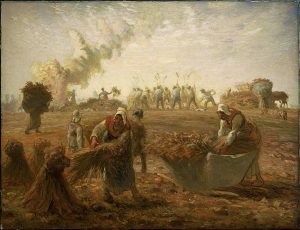Illuminations on the Lectionary readings for July 23, 2023 (Pentecost 8A)
First Reading (Track One): Genesis 28:10-19a
God knows us. God sees us. God cares for us, and God calls us. Look for signals of love and grace throughout Sunday’s Lectionary readings.

Buckwheat Harvest, Summer (1868-74), oil painting on canvas by Jean-François Millet (1814-1875). Museum of Fine Arts, Boston. (Click image to enlarge)
In the first reading, Jacob is in trouble and is running away for his own safety. He is afraid of the murderous wrath of his older twin Esau, whom he has tricked out of his inheritance and their father’s blessing. In this passage Jacob stops to rest. He dreams an amazing dream about angels ascending and descending a heavenly ladder. Then he hears the voice of God, offering a promise like the one that his grandfather Abraham and his father Isaac received: God is with him, and his offspring will fill the Earth. Jacob receives God’s promise in spite of his trickery. God knows full well that humankind is far from perfect, and so God works with broken, troubled people like Abraham, Isaac, Jacob and on down the line.
First Reading (Track Two): Isaiah 44:6-8
Our Track Two first reading excerpts a short, poetic prayer of praise from within Isaiah’s prophecy. The prophet assures the people that they will eventually return home to Jerusalem from their exile in Babylon. Isaiah imagines the voice of God proclaiming God’s own power and majesty in these simple terms: Never mind the beliefs that their captors may hold about other gods and other prophesies. Israel need not fear or be afraid. God is not only the nation’s redeemer and leader, but the first and last of all creation. The prophet hears the Creator saying, “Is there any god besides me? There is no other rock; I know not one.”
Psalm (Track One): Psalm 139: 1-11, 22-23
If Jacob in the first reading had taken a moment of introspection and examined his conscience, he might then have lain awake on that desert night, fearing Esau’s revenge and meditating on something like these ideas from Psalm 139: Even if we run from God, we cannot hide from God. In heaven or in the grave, in darkness or in light, up in the sunrise sky or down in the deepest part of the sea, no matter where we go or how we try to hide, God knows where we are and what we are thinking. Even when we are wicked, God will lead us back onto right paths.
Alternate Psalm (Track One): Wisdom of Solomon 12:13, 16-19
The Wisdom of Solomon, a short book in the Apocrypha, was written in King Solomon’s name not long before, or even possibly during or after, the time of Jesus and the evangelists. These verses seem to echo the faith of Psalm 139 – for which this passage is available as an alternative – in their ringing praise for a powerful, righteous God who reigns over all creation. In spite of this omnipotent state, this is a God who guides the people mildly and with forbearance, showing us that to be righteous requires us to be kind.
Psalm (Track Two): Psalm 86:11-17
The Psalmist is grateful for God’s abundant love shown in protection against the violence and threats of enemies. Like the people in exile in the Track Two first reading from Isaiah, they face difficulties – even being pursued by a band of violent, murderous men. In the midst of fear and desperation the Psalmist turns to God with faith and trust, calling on God to respond out of grace and compassion, kindness and truth, and to have mercy, shaming the people’s foes with a sign of God’s favor.
Second Reading: Romans 8:12-25
As we read portions of Paul’s letter to the Romans through this summer, you may have noticed that he uses consistent language to teach a specific idea: In flesh there is death; in the spirit of Christ there is life. Paul emphasizes these points once more in this passage: If we live by our own selfish desires, he says, we eventually die. But if we live in the Spirit through Christ, loving God and our neighbor even while we suffer with Christ – just as the early Christians of Rome suffered persecution – we are glorified with him and become beloved children of God, literally God’s adopted children and thus God’s heirs.
Gospel: Matthew 13:24-30, 36-43
Following immediately upon last week’s Gospel about the sower and the soil, we meet another sower in another of Jesus’ parables as told by Matthew. This time the soil is good, and so is the seed. The sower is planting wheat in the rich soil of his own field. But now a new challenge arises: An unidentified enemy sneaks in at night and plants weeds among the good wheat. The sower can’t simply uproot the weeds without disturbing the wheat, so the good growth and the bad must grow together until harvest, when the weeds can finally be torn out and discarded. Jesus explains the parable in terms that may feel disturbing with his talk of hellfire and damnation for the weeds. But in a promise reminiscent of God’s covenant with Moses at Mount Sinai, Jesus makes it clear that those who live righteously will enjoy God’s kingdom.
